Tradition and technology: how these entrepreneurs are monetising Indian culture and crafts
Three enterprises recently won awards for business potential in the culture space. Here are market insights from their founders.
Winners of the recent Aarohana Business Plan Competition 2021 were announced for early-stage and growth-stage cultural enterprises. Co-founded by Sanjay Anandaram, the Network of Indian Cultural Enterprises (NICE) aims to build ‘Brand India’ through its cultural and creative economy.
It supports entrepreneurs who leverage the commercial potential of indigenous culture, heritage, and knowledge via a transformed product, service or experience by promoting startups who respect principles of authenticity, innovation, diversity, sustainability and inclusion. Target domains include wellness, food, fashion, décor, and tourism.
NICE Aarohana is a free, online, three-month programme for distinguished entrepreneurs, with support from experts and mentors. It includes workshops and peer learning opportunities in branding, fundraising, supply chains, and operational scaling.
From more than 100 applications received earlier this year, 10 were shortlisted for the early stage category. The jury consisted of Ritu Verma, Suresh Bhagavatula, Naga Prakasam, Chintan Bakshi, and Madan Padaki.
The winners also receive cash prizes, certificates, and publicity. Three overall winners were declared in the early stage category.
AyuRythm is a digital platform for personalised holistic wellness based on Ayurvedic health assessment principles. is a multi-cuisine platform promoting traditional and native delicacies made by home chefs. Tamaala (‘evergreen tree’) is a social organisation working with 150 rural and tribal artisans, and brings the aesthetics of Indian craft and art to homes.
In this article, founders of these organisations share insights on problem-spotting, traction, pandemic resilience, future plans, and success tips for other aspiring entrepreneurs.
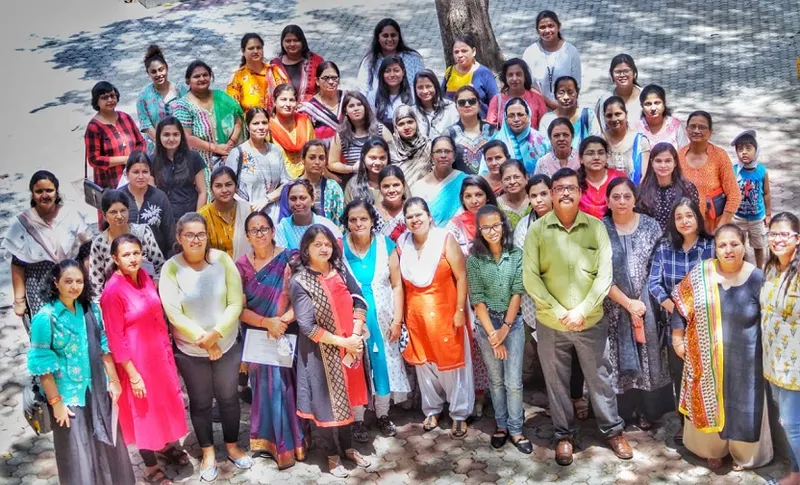
Team NativChefs
Problem spotting
“In the world of fusion and innovation, people are moving away from their origin. In spite of the diversity of Indian food, nativity is vanishing. Home chefs have exceptional culinary skills but do not have a platform to showcase it,” explains Leena Dixit, Founder of NativChefs, in a chat with YourStory.
She was earlier at Persistent Systems and Madison PR, and has participated in the Women’s Startup Programme at IIM Bangalore. She is a tech graduate, and branched out into marketing, HR and entrepreneurship.
“We were friends and neighbours for 15 years, and shared common interests such as running, cricket and golf. We could not but notice that there were many people who hated calorie counting and bodybuilding, but still aspired to look good and stay well,” says AyuRythm founder Abhilesh Gupta, explaining how his founding team spotted the market gap.
Their idea was to create a solution which is sustainable and always available to the users. The trio evaluated several methods of wellness and zeroed upon the traditional Indian method of Ayurveda to address the needs of this market segment.
“Ayurveda wellness is based on simple do’s and don’ts and does not require extensive logging of food and calorie intake,” Abhilesh says. The whole idea was to bring in a technological angle for the simplified solution, with personalised advisory and to take it beyond the believers’ segment.
Abhilesh has a background in engineering, manufacturing and marketing, and is an avid user of health gadgets and devices. Co-founder Sandeep Acharya is a computer engineer with experience in finance and analytics, while Ramanath Padmanabhan has broad experience in the health and wellness space.
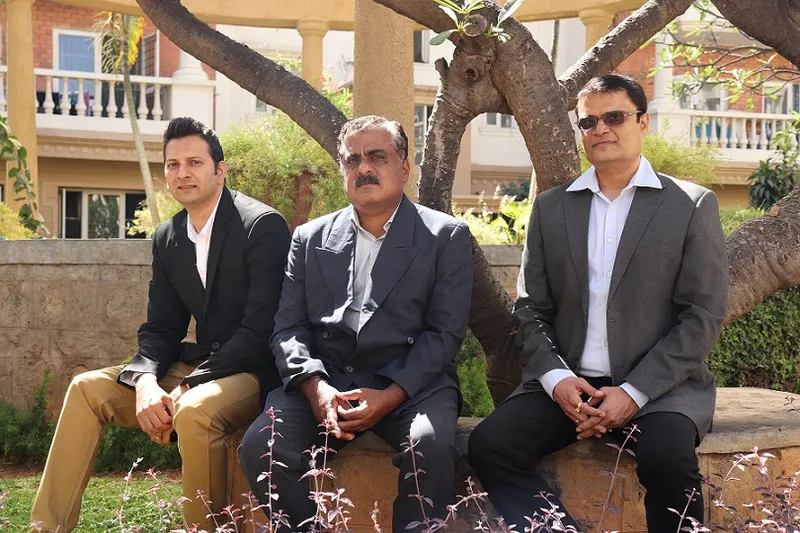
AyuRythm Team Sandeep, Ram, Abhilesh (L-R)
“We are witnessing reduced usage of Indian traditional products in home décor, which will impact the livelihoods of craftspeople as well as the continuity of the art and craft itself,” explains Vinay Prashant, Co-founder of Tamaala art studio (see earlier PhotoSparks essay here).
The next generation of artisans are steadily leaving the trade for jobs in the cities. “If the earning potential was levelled with a city job, then more artisans would rather stay back in the comfort of their villages and towns,” Vinay adds. But for urban families who want traditional art and craft as decor options, the number of unique offerings in the market is few and far between.
Vinay Prashant is a management professional with 18 years of experience in retail, telecom and media. Co-founder Suvarna Kamakshi is an artist with experience in customer service as well, and handles design and curation (see earlier photo essay here).
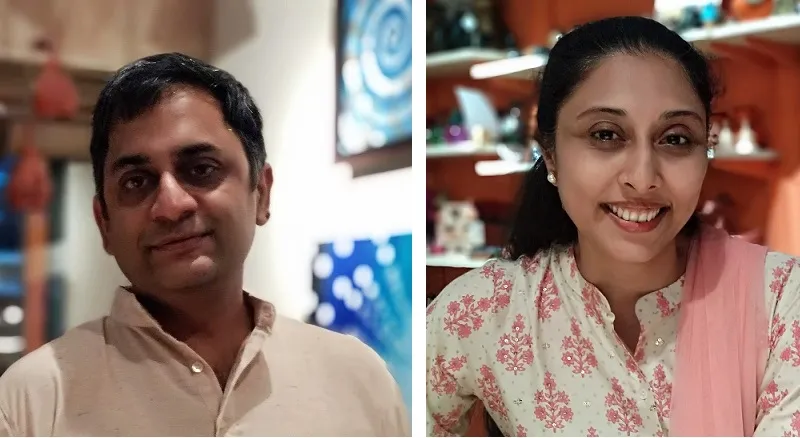
Tamaala Co-founders Vinay Prashant (L), Suvarna Kamakshi (R)
Traction
AyuRythm’s Abhilesh claims their wellness app has around 60,000 downloads and 30,000 users, with 13 minutes of average engagement time per user. “While pre-revenue, we still have seen close to 90 paid transactions,” he adds.
Monetisation is via commission from products, services and the content marketplace. He shares some customer testimonials as well. Some users even offered suggestions like adding features for group meals and family recommendations.
"Simple, easy to navigate. Offers quick analysis of Vat Pitt Kaph balance. The huge amount of data shows that someone has built it with love and great insight of Ayurveda.”
“I find my body, my diet, and my sleep cycle resonating with the results and suggestions provided by the app. Brilliant work, absolutely must have app.”
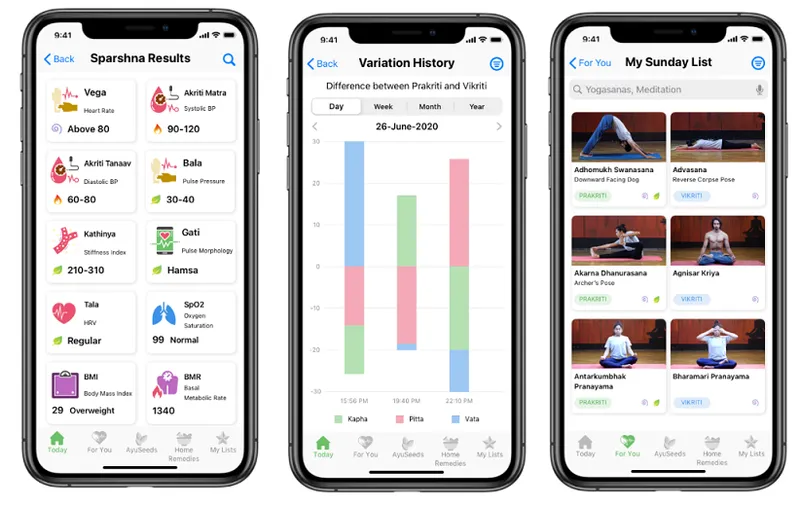
AyuRythm app
Vinay of Tamaala claims to have about 3,500 customers on the retail storefront as well as the website (which became active during the pandemic). They also have ten institutional customers. Some of the design-based craft and innovations have received customer testimonials on social media as well.
"It is a general apprehension that the artisans may give you a functional product and not aesthetically designed/packed one. But, you must see Tamala's work. They are bringing forgotten Indian board games and puzzles to the world back again." - Ramesh Kumar, CTO, Eduquity
"The Founder of Tamaala - Suvarna Kamakshi and Vinay - are giving it back. In their own way. Changing lives for good." - Chandra, DRDO Scientist
NativChefs now has more than 70 chefs on board in Nagpur, who have sold over 10,000 delicacies. Some customers raved about specific dishes and said it brought back childhood memories. Others appreciated the punctual delivery and package design, and said they didn't miss visiting restaurants during the lockdown.
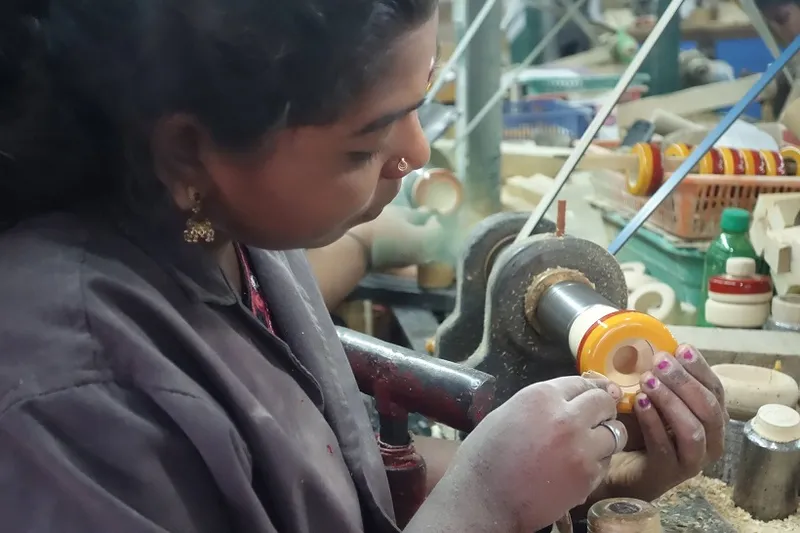
Tamaala artisan
Award benefits
The NICE Arohana programme and awards have a number of advantages for winners and finalists. “Finally, culture startups are getting a platform. Though their growth might look slow, the impact is huge,” Leena of NativChefs explains. Being a part of the programme also helps with networking and mentor connects.
The award will bring more visibility, retail customers and institutional leads, according to Vinay of Tamaala. They can benefit from access to mentors and thought leaders, as well as growth funds.
AyuRythm’s Abhilesh feels the award programme will help connect with the larger cultural enterprise ecosystem worldwide. Access to expert mentors and quality capital can help build and scale the enterprise.
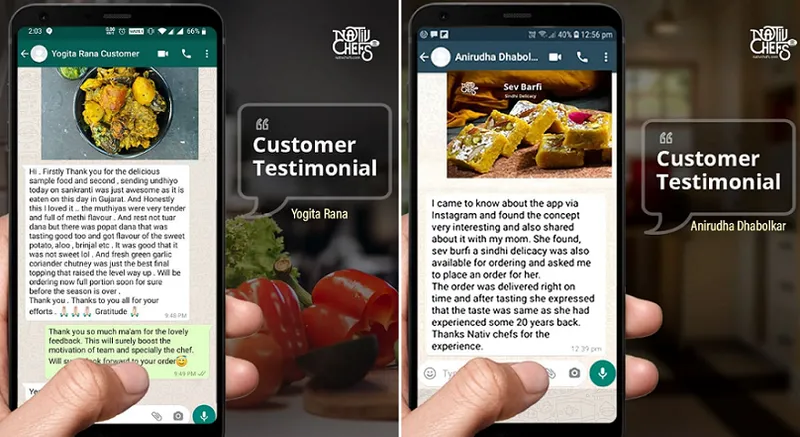
NativChefs customer testimonials
Pandemic impacts
The ongoing COVD-19 pandemic had adverse economic and health impacts, but also accelerated some sectors and channels. “The pandemic reduced barriers for digital wellness coaching and DIY methods. It renewed and rekindled interest in our age-old wisdom like Ayurveda and yoga,” explains AyuRythm’s Abhilesh.
The culture of working from home also brought down operational and travel cost significantly. “We could connect to mentors and VC online without incurring costs and time for travel,” he adds. However, there were significant disruptions in product development and launch due to lockdown in the early phases of the pandemic.
“People are looking forward to healthy home-cooked delicacies, which has given us an opportunity,” Leena observes.
“We suffered from lack of walk-ins at the studio during the lockdowns. More importantly, all our artisans ran out of money since we were unable to support them without revenues coming in,” recalls Vinay of Tamaala.
Though they did reach out to a few customers for donating money to artisans wherever there was a dire need in the early stages of the lockdown, charity was not a long-term solution. “We worked first on activating our e-commerce platform,” Vinay explains.
“We saw how our customers’ lifestyles changed drastically, and looked at how we could make stay-at-home more pleasurable for families. We also took this as an opportunity to reach out to other crafts organisations and NGOs to spread our impact and collaborate on the design front,” Vinay adds.
For example, the acoustic amplifier project landed them a craft fellowship from the Indic Academy in Hyderabad. This was used to work on design improvements along with partners such as Maya Organic (now Faircraft Creations), according to Vinay.
Other notable projects featured Terracotta Rakhi, traditional games (with Hosa Belaku artisan foundation), eco-friendly Ganesha project (2,500 idols delivered across homes in Bengaluru), and Deepavali lamp-making at Ramanagara and other pottery clusters.
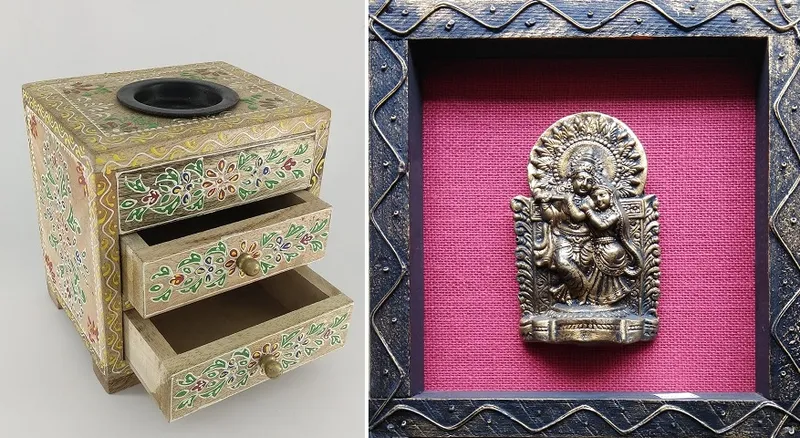
Tamaala artworks
The road ahead
Looking ahead, AyuRythm’s Abhilesh plans on scaling the number of downloads, registered users and engagement. They also plan to target markets beyond India, like the US and Europe. Based on customer feedback, the product will be enhanced and monetised.
NativChefs plans to launch in multiple cities, and thus create employment opportunities for home chefs to showcase their talent.
“We would like to reach 10,000 retail patrons in India and globally. We would like to on-board at least another 10 institutions,” explains Vinay of Tamaala. They plan to improve the earnings of their artisans and seek more collaborations with NGOs.

Founder tips
The founders also offer insights and success tips for other aspiring entrepreneurs. “Nothing is right or wrong. Take a decision and make it happen,” advises Leena of NativChefs.
“Try and look at value creation for the consumer in each step. Collaborate, the age of competition is over,” advises Vinay of Tamaala. “Have an effectual approach daily to entrepreneurship,” he adds.
“Take quick judgment calls, but verify it with data. Embrace change, adapt to it,” advises AyuRythm’s Abhilesh. “Don’t be afraid to take feedback and constructive criticism,” he signs off.
Edited by Anju Narayanan



![[Year in Review 2020] Here are the Top 5 Pivot and Persist stories about startups that changed their business models amidst COVID-19](https://images.yourstory.com/cs/2/fd6b2ee0c6f411e8af1c974e95f3b2db/shutterstock1207152979-1590084243782.jpg?fm=png&auto=format&h=100&w=100&crop=entropy&fit=crop)





